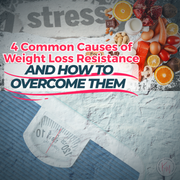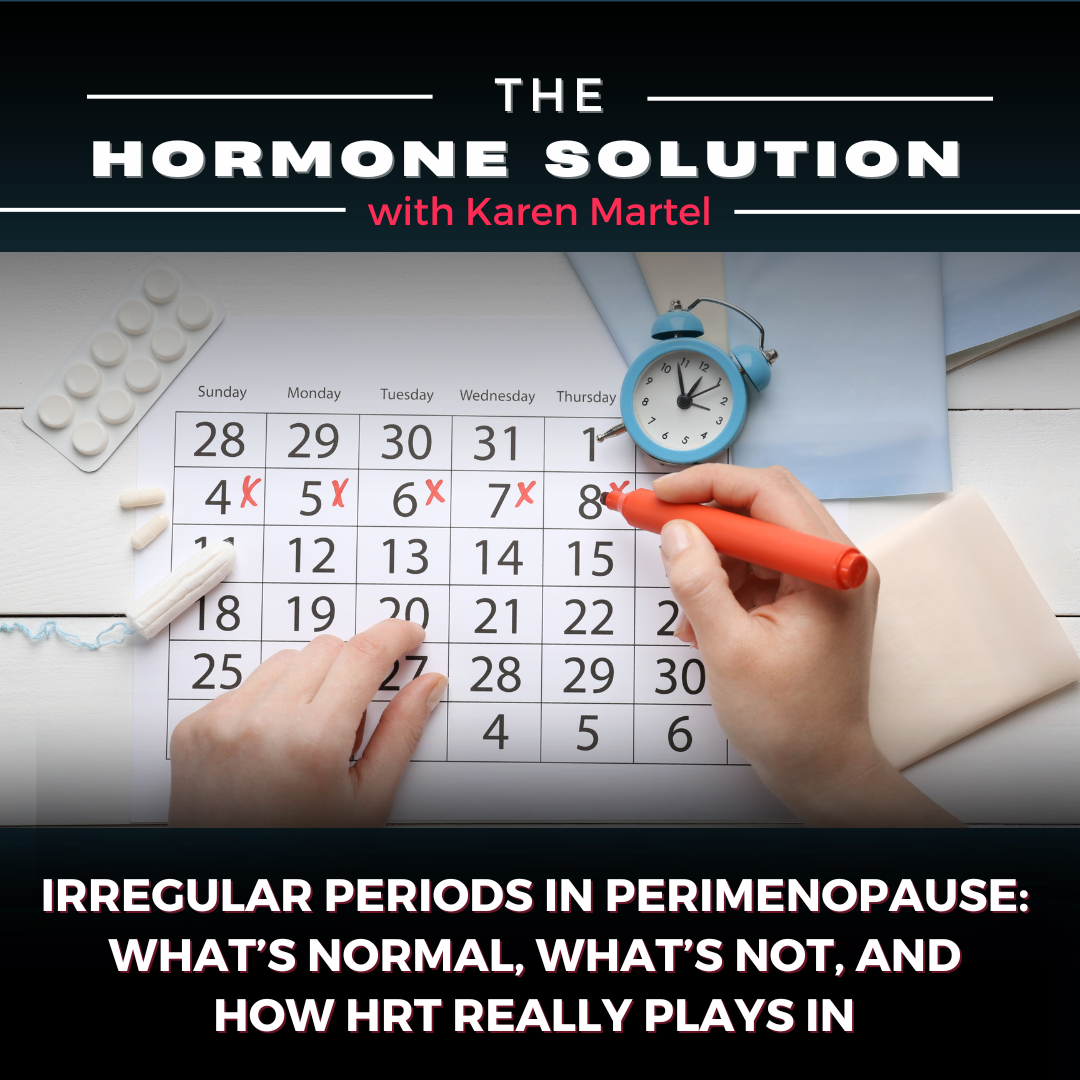
Is Your Birth Control Making you Fat?
Birth control pills are a widely used method for preventing pregnancy, but they often come with a whole host of unpleasant side effects. Among these, weight gain is a common concern for many women. While birth control is an effective contraceptive option, understanding how it can impact your body, including its potential to cause weight gain, is crucial. Birth control pills work by shutting down our body's natural production of vital hormones like testosterone, estradiol, and progesterone. These hormones play significant roles in maintaining our overall health, including our metabolism. When we take birth control pills, they introduce synthetic hormones into our system. These synthetic hormones trick the body into thinking it’s already pregnant, which suppresses the ovaries' natural production of testosterone, estradiol, and progesterone. This suppression helps prevent ovulation and, consequently, pregnancy. However, these natural hormones are essential for more than just reproduction. Testosterone helps build and maintain muscle mass, which is crucial for a healthy metabolism and fat burning. Estradiol, a form of estrogen, plays a vital role in regulating body weight by influencing how our bodies store fat and how we respond to insulin. Progesterone supports thyroid function, which is key to a well-functioning metabolism.
By shutting down our natural hormone production, birth control pills can disrupt these metabolic processes, potentially leading to weight gain and other metabolic issues. Understanding this hormonal impact can help you make informed decisions about your contraceptive options and how to manage any side effects.
Birth Control and Your Hormones
Here’s the lowdown on what happens with different types of birth control:
- Combined Estrogen-Progestin Methods (like the pill, patch, or ring): You’ll produce almost no estradiol or progesterone. Instead, you get synthetic hormones like ethinylestradiol (a synthetic estrogen) plus one of several progestins.
- Depo-ProveraⓇ Injection: No estradiol and progesterone here either, just the drug medroxyprogesterone.
- Progestin-Only Methods (like implants or the so-called “progesterone-only” pill): You’ll make some estradiol but no progesterone, swapping it out for progestins like norethindrone, levonorgestrel, etonogestrel, or drospirenone.
- Hormonal IUD: This one’s a bit different. You may still ovulate and produce your own estradiol and progesterone, but you’ll have a low level of the progestin levonorgestrel throughout your body.
How Do Different Contraceptive Drugs Affect Metabolic Health?
Now, let’s talk about the nitty-gritty of how these contraceptive drugs can affect your metabolism:
Ethinylestradiol
Ethinylestradiol, a synthetic form of estrogen commonly found in birth control pills, can contribute to weight gain through several mechanisms:
- Water Retention: Ethinylestradiol can increase the body's retention of water and sodium. This fluid retention can lead to a noticeable increase in weight, often referred to as water weight, and can make you feel bloated and puffy.
- Altered Fat Storage: Estrogen plays a role in how and where the body stores fat. Ethinylestradiol can influence the redistribution of body fat, potentially leading to increased fat storage in areas like the hips, thighs, and abdomen.
- Increased Appetite: Some women report an increase in appetite when taking birth control pills containing ethinylestradiol. This can lead to higher caloric intake and, subsequently, weight gain if not managed properly.
- Impact on Insulin Sensitivity: Ethinylestradiol can affect how the body processes insulin, potentially leading to decreased insulin sensitivity. This can result in higher blood sugar levels and increased fat storage.
- Hormonal Imbalance: By introducing synthetic hormones, birth control pills can disrupt the natural balance of hormones in the body. This disruption can affect metabolism and energy expenditure, making it easier to gain weight and harder to lose it.
Progestins
Progestins are synthetic hormones used in birth control pills to mimic the effects of the natural hormone progesterone. They play a crucial role in preventing pregnancy by inhibiting ovulation, thickening cervical mucus to block sperm entry, and thinning the uterine lining to prevent egg implantation. While progestins are effective in contraception, they can also impact weight in several ways:
- Increased Appetite: Some progestins can stimulate appetite, leading to increased food intake. If not managed, this can result in weight gain over time.
- Fluid Retention: Similar to estrogen, certain progestins can cause the body to retain water, leading to temporary weight gain and a feeling of bloating.
- Changes in Fat Distribution: Progestins can influence where the body stores fat. This may lead to changes in body composition, with more fat being stored in areas like the abdomen, hips, and thighs.
- Impact on Insulin Sensitivity: Progestins can affect how the body processes insulin, potentially decreasing insulin sensitivity. This can lead to higher blood sugar levels and increased fat storage, particularly around the midsection.
- Muscle Mass and Metabolism: Some progestins may have a catabolic effect, meaning they can break down muscle tissue. Since muscle mass is crucial for a healthy metabolism, a decrease in muscle can lead to a slower metabolism and weight gain.
A Closer Look at Depo-ProveraⓇ
Medroxyprogesterone acetate, the active ingredient in Depo-ProveraⓇ, is a synthetic progestin used as a contraceptive injection. It works by preventing ovulation, thickening cervical mucus, and thinning the uterine lining to prevent pregnancy. However, it can also have various side effects, particularly due to its slightly androgenic properties. Here are some of the effects and mechanisms:
- Weight Gain: Weight gain is a well-documented side effect of Depo-ProveraⓇ. The exact mechanism is not fully understood, but it is believed to be a combination of increased appetite, changes in fat distribution, and fluid retention. Medroxyprogesterone can alter the body's metabolism and fat storage, leading to an increase in body weight.
- Mood Changes: Some women report mood swings, depression, or other emotional changes when using Depo-ProveraⓇ. The hormonal changes induced by medroxyprogesterone can affect neurotransmitters in the brain, influencing mood.
Birth Control Pills and Your Thyroid
Thyroid function is key to maintaining a healthy weight because the thyroid gland produces hormones that regulate metabolism, the process by which your body converts food into energy. Thyroid hormones, particularly thyroxine (T4) and triiodothyronine (T3), influence how efficiently your body uses energy, affects your basal metabolic rate, and play a crucial role in regulating various bodily functions, including digestion, heart rate, and muscle control. When thyroid function is impaired, as in hypothyroidism, metabolism slows down, leading to weight gain, fatigue, and difficulty losing weight.
Understanding Thyroid-Binding Globulin (TBG)
Thyroid-binding globulin is a protein produced by the liver that binds to thyroid hormones (thyroxine, T4, and triiodothyronine, T3) in the bloodstream. The bound thyroid hormones are inactive, while only the free (unbound) hormones are biologically active and can enter cells to regulate metabolism.
Impact of Birth Control Pills on TBG
Increased TBG Levels: Birth control pills, especially those containing estrogen, can increase the production of TBG. Estrogen stimulates the liver to produce more TBG, which leads to higher levels of this protein in the blood.
Thyroid Hormone Binding: With more TBG available, a greater proportion of thyroid hormones in the bloodstream becomes bound to TBG. This reduces the amount of free (active) thyroid hormones.
Total vs. Free Thyroid Hormones: Although the total levels of thyroid hormones (bound plus unbound) may remain within the normal range, the increased binding can reduce the levels of free T4 and free T3, which are the hormones that exert the metabolic effects.
Birth control pills can increase thyroid-binding globulin levels, which in turn can affect the balance of bound and free thyroid hormones in the body. This can potentially lead to symptoms of hypothyroidism.
Hormonal Influences
In addition to the mechanisms previously mentioned, birth control pills can cause weight gain through several other pathways. Here are some more ways in which birth control pills can impact weight:
Altered Appetite Regulation: Hormonal fluctuations caused by birth control pills can affect hunger and satiety signals. Changes in hormone levels, particularly estrogen and progestin, can influence appetite, potentially leading to increased food intake and weight gain.
Changes in Basal Metabolic Rate (BMR): Hormones regulate the body's metabolism. Birth control pills can alter the basal metabolic rate, the amount of energy the body needs at rest. A decrease in BMR can mean fewer calories are burned, contributing to weight gain.
Water and Sodium Retention
Fluid Retention: Many birth control pills contain estrogen, which can promote the retention of water and sodium. This can cause temporary weight gain due to fluid buildup, leading to feelings of bloating and puffiness.
Insulin Sensitivity
Impact on Insulin Resistance: Birth control pills can affect how the body processes glucose and insulin. Changes in insulin sensitivity can lead to higher levels of insulin in the blood, which can promote fat storage, especially around the abdominal area.
Fat Distribution
Altered Fat Distribution: Hormonal contraceptives can influence how and where the body stores fat. This can lead to an increase in fat deposits in certain areas, such as the hips, thighs, and abdomen.
Psychological Factors
Mood Changes: Birth control pills can affect mood and emotional well-being. For some women, this can lead to changes in eating behaviors, such as emotional eating, which can contribute to weight gain.
Muscle Mass and Physical Activity
Changes in Energy Levels and Physical Activity: Some women may experience fatigue or a decrease in energy levels when taking birth control pills. This can lead to reduced physical activity, which can contribute to weight gain over time.
Gastrointestinal Effects
Digestive Changes: Hormonal contraceptives can sometimes cause gastrointestinal issues such as leaky gut, bloating or constipation. These changes can affect how the body processes and stores food, potentially contributing to weight gain.
Individual Variability
Genetic and Individual Factors: The response to birth control pills can vary widely among individuals due to genetic differences, lifestyle factors, and pre-existing health conditions. Some women may be more prone to weight gain due to their unique physiological makeup.
Conclusion
While not all women will experience weight gain from birth control pills, understanding the potential mechanisms can help in making informed choices about contraception. If weight gain is a concern, discussing alternative contraceptive methods or different formulations of birth control pills with a healthcare provider can help find the most suitable option.
If you’re worried about how your birth control might be affecting your weight and metabolism, it might be time to explore other options.

Find Karen Martel on Apply Podcast
Karen Martel is a Certified Hormone Specialist and Transformational Nutrition Coach dedicated to empowering women through their health journeys.
As the host of the popular podcast The Hormone Solution, Karen tackles the complexities of hormonal health, weight loss resistance, and the challenges that come with perimenopause and menopause.
Her mission is to disrupt outdated narratives surrounding women's health, providing reliable information and practical solutions that help women reclaim their vitality.
Tune in to discover how to embrace life's stages while enhancing overall well-being.





